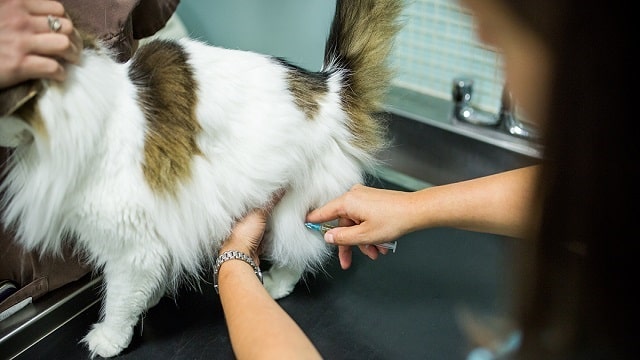Protect your cat and keep up to date with its vaccination schedule to keep your cat strong and healthy.
Having a cat as a pet involves a series of responsibilities that you must be willing to fulfill from the moment the feline enters your life. These animals not only need your affection, but it is essential that you pay attention to their health. To do this, you must follow some guidelines for their care and precisely comply with the vaccination schedule that we detail here.
Your pet’s age, breed, and even the area in which you live can all imply variations in the vaccines you should administer to your cat. However, there are a number of invariable guidelines to ensure the health of your feline.
Vaccination schedule
Cats are elegant and methodical animals, even when it comes to vaccination. The schedules established in the vaccination schedule must be strictly adhered to, otherwise the treatment will lose its effectiveness and the process will have to be started again.
The first stop on the vaccination path is deworming. This is followed by a process that includes mandatory vaccinations for all felines and other specific vaccinations depending on the characteristics of your cat and other external factors.
Thus, the trivalent feline vaccine, the leukemia vaccine, and the rabies vaccine constitute the three fundamental pillars to take into account when protecting your cat’s health. As a complement, we find protection against other conditions such as feline infectious peritonitis and chlamydia.
Mandatory vaccines: feline trivalent, leukemia, and rabies
The first step is to deworm your pet. The appropriate date to undergo this treatment is 40 days after birth. Deworming is applied using a special pill or paste and is extremely important for subsequent vaccination.
The feline trivalent is applied after the animal is weaned.
This vaccine will protect your cat against panleukopenia, rhinotracheitis, and feline calicivirus. Panleukopenia is a disease with virtually no survival among younger cats, while an adult cat can survive. In any case, the vaccine helps prevent your cat from being affected by this disease, the main symptoms of which are vomiting and diarrhea. Rhinotracheitis is a chronic respiratory disease against which you should vaccinate your cat. Animals that contract it will go through healthy stages and others in which they will present different symptoms such as greenish nasal secretions. Finally, calcivirosis is a disease that affects the mouth, throat, and lungs of the cat.
Four weeks later, you will need to go back to the vet to give your pet the second dose of this vaccine. The process will need to be repeated annually from then on.
The rabies vaccine is mandatory if you are traveling with your pet and is available in most of Spain’s autonomous communities. There are regions where it is voluntary. The rabies vaccine is administered to the animal at six months of age and must be renewed periodically.
Specific vaccines: feline infectious peritonitis and chlamydia
Like the rabies vaccine, the feline leukemia vaccine is not part of the general mandatory vaccination schedule. A routine test will confirm the obligation and suitability of vaccinating your cat. It is very important to protect your cat against this disease with high mortality among felines. The leukemia vaccine is administered at three months of age and has two doses. However, it is best to consult your veterinarian.
The chlamydia vaccine is one of the most widely accepted voluntary treatments. This treatment protects cats from a disease that causes purulent conjunctivitis and rhinitis.
The vaccine against feline infectious peritonitis, on the other hand, is less popular. It is a treatment that is administered to the animal orally, with a pill or nasal treatment. Critics of this vaccine doubt the effectiveness of the treatment against this disease characterized by affecting the fur on the belly and chest of the feline.
Another factor to consider when choosing the voluntary vaccines your pet will receive is the breed of the animal. Persian cats – like other brachyface breeds – have a shorter nose and are more prone to rhinotracheitis and calicivirus. If you own one of these animals, we recommend that you pay special attention to these ailments.
Your area of residence and possible cohabitation with other felines complete the list of external factors that will help you configure your cat’s vaccination schedule. Once the process is complete, the veterinarian will provide you with a vaccination certificate. However, do not forget that many of these vaccines need boosters every certain period of time. Consult your veterinarian if you have any questions in this regard.

